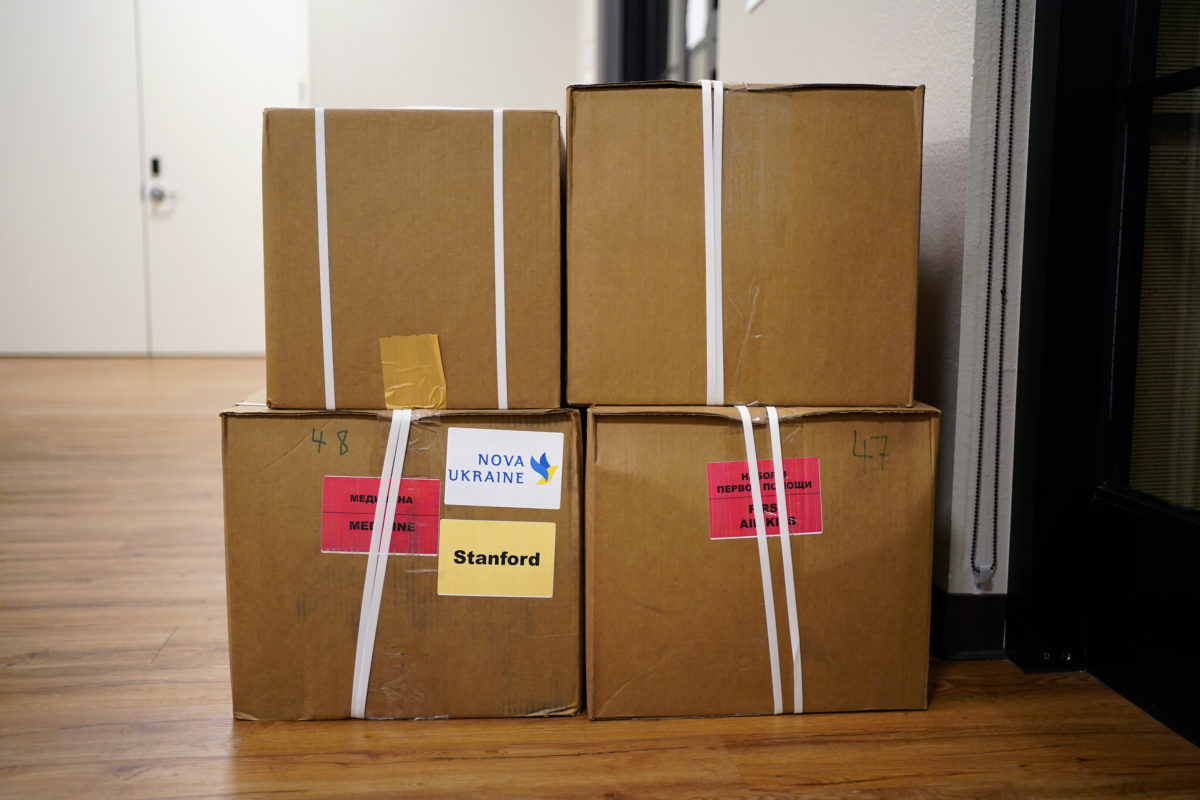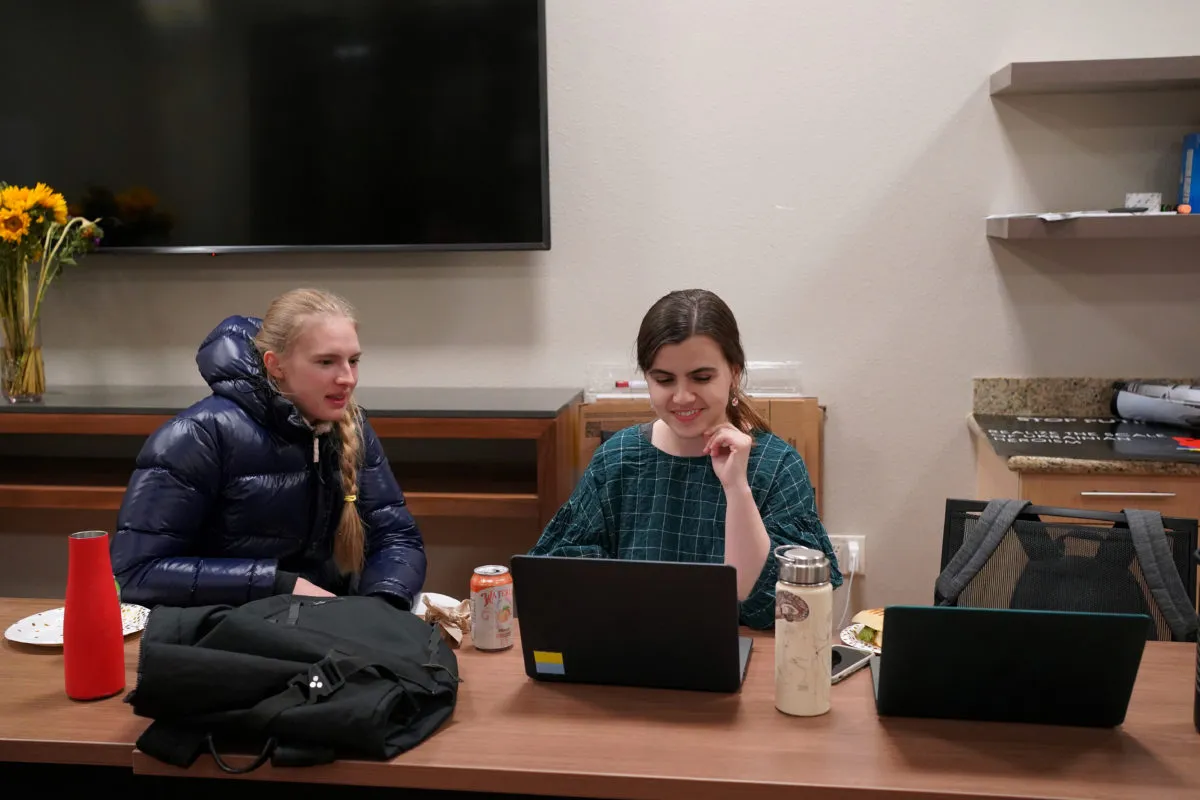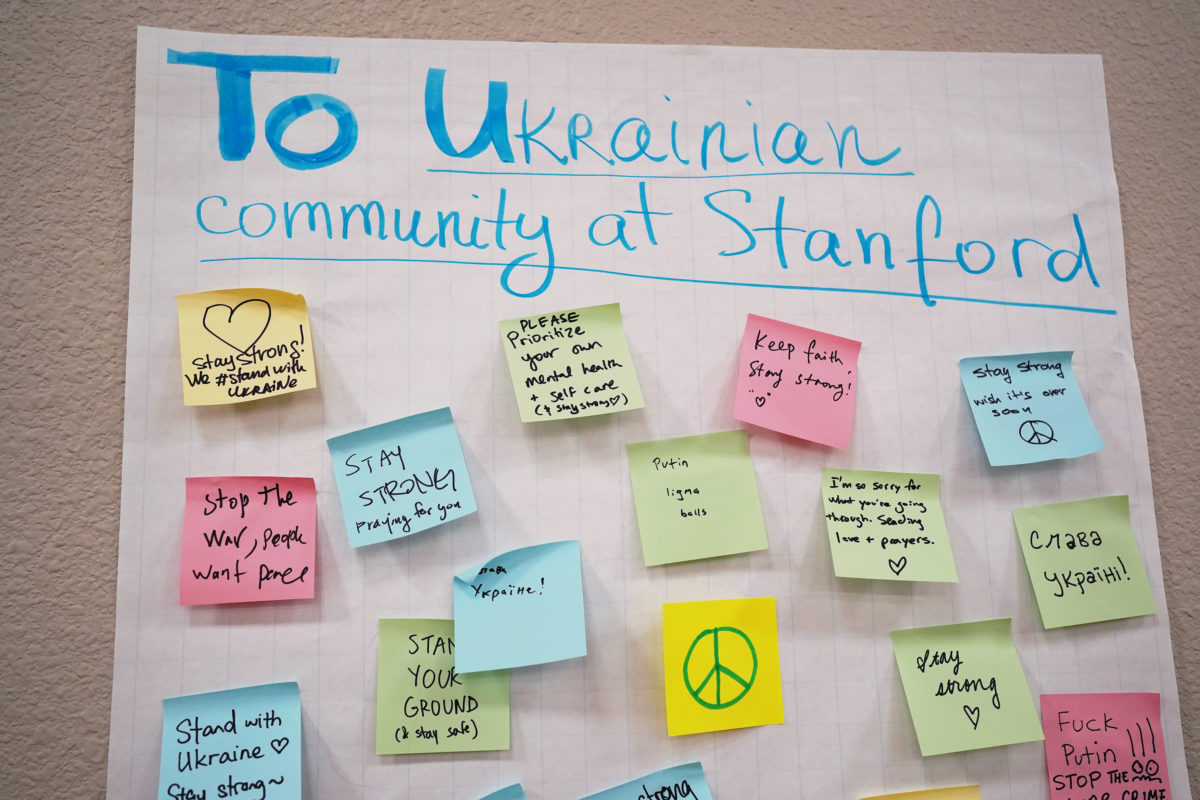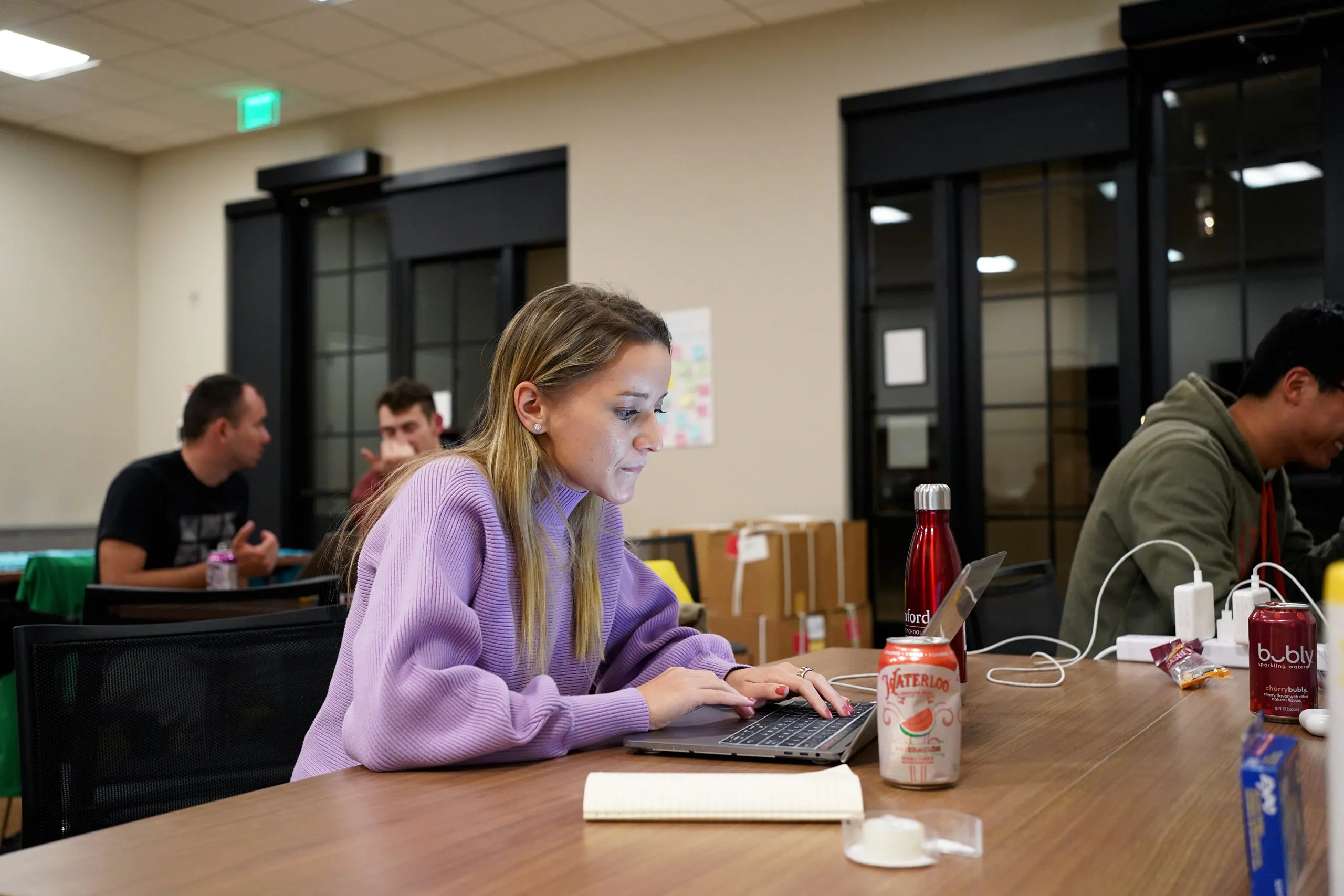Kate Sliunkova arrives at the Coordination Hub at 6:30 p.m. as the sun sets over the Stanford campus, filling the sky with shades of pink and purple. Since Russia invaded Ukraine three weeks ago, the hub, a converted study room in graduate housing, has become the center of student advocacy efforts. Kate’s phone is pressed to her ear, and she’s ready to work.
She barely gets the chance to set her belongings down before a situation requires her attention. Students are carrying boxes, lashed together with plastic and labeled with their weights. Jacob Blaeser MBA ’22 ticks off what is inside: gauze, rubbing alcohol, trauma kits. These boxes are headed to the Ukrainian border, along with 40 students in the Graduate School of Business who will carry them for the first leg of the trip as checked luggage on a school trip to Poland.
“Nothing questionable?” Kate asks, alluding to bulletproof vests or helmets — items that would require special clearance.
“Nothing questionable,” Jacob confirms.
Kate surveys the room, about the size of a seminar classroom. A Ukrainian flag is draped over the television, and another handmade flag for Crimea symbolizing freedom rests on a chair. A whiteboard on the side of the room details plans in dry-erase ink alongside the phonetic spelling of a Ukrainian word that native Russian speakers cannot pronounce. Near the windows hangs a poster of support decorated with pastel notes to the Ukrainian community.
A few students are already here, but more will trickle in through the night. Kate will provide a bit of help to everyone, a de-facto leader of the group with the tendency to use “we” and not “I” when describing their efforts. There’s plenty already in progress, from outreach to groups at other schools to telehealth solutions and prep work to load a plane with 130 tons of supplies for Ukrainians.
She’ll be here late into the night alongside a dozen or so other students doing whatever they can to help. While their primary goal is to organize for Ukraine, the solidarity also provides solace — these are students who are also living through the pressure of unrelenting updates from home, students who understand that this isn’t just another Week 10. Multiple times a day, Kate will start to shake. The tremors are worst when she’s reading the news. When she’s in the hub, at least she can help. And tonight, there is work to be done.

***
Kate was born and raised in Dnipro, a city in eastern Ukraine. She completed her undergraduate education in Kyiv, leaving the country soon after for a master’s degree in France, which propelled her into a career in fashion that brought her first to New York and then to Stanford to pursue an MBA and M.A. in education.
For now, her hometown is not a key Russian target, though the airport that she used to fly home to has been destroyed. Residents of Dnipro are helping refugees from the east and south, and Ukrainian air forces are shooting down the rockets that pass above the city to other regions. Kate’s family members who are still in the country can’t escape the sound of the explosions. Kyiv, the capital city, is bearing the brunt of Russian aggression, though a staunch defense from Ukrainians has kept the city from falling.
The night Russia invaded was a sleepless one for Ukrainian students, who received the news while scattered across campus. The next day, Kate and other Ukrainian students met at a student-organized rally in support of Ukraine at Main Quad, where they decided to combine their efforts. Kate secured a room in Escondido Village Graduate Residences Building B (EVGR-B), and they worked together for the first time that night. It wasn’t just about working together, she said, but also being together.
“It’s very hard to cope when you are alone in a room,” she said. “My initial reaction was that we needed to come together so that all the Ukrainians know that there is a place where people will be there for them.”
Finding time for everything is not easy. For the past three weeks, Kate has been a full-time student and a full-time advocate. Kate says her spouse sometimes worries that she spends too much time with the other Ukrainian students, not thinking about her career.
“I tell him that’s what school teaches me — to be a leader of a community, not only a leader of my class,” she said.
6:30 p.m.
Kate sits down to flip open a notebook she uses to keep track of what she needs to do. The notebook is forest green and emblazoned with a Stanford logo — it was the only one in sight when the conflict broke out. Among other tasks for tonight, she needs to reach out to a group of alumni, write thank-you notes to everyone who donated to an aid campaign and ask professors to engage with a fundraiser.
Josh Pickering M.D. ’22 chimes in with updates on the status of the plane. The students are collaborating with Nova Ukraine, a local non-profit and Ukrainian aid organization, to send a plane with medical supplies and humanitarian relief to refugees at the border. He’s finished a meeting about a potential collaboration with another school and has a status update on the logistics of getting supplies to Seattle.
7 p.m.
Kate walks through the room and takes input for the dinner order, which she is coordinating tonight. Bohdan Kamets, whose partner Solomiia Savchuk M.D. ’24 attends Stanford, suggests making varenyky, a traditional Ukrainian dumpling dish. Both are volunteering with the group.
Solomiia shakes her head. “We win first and then cook,” she says. They settle on sandwiches from Mendocino Farms.
Solomiia is working with a group of students and medical professionals on a telehealth platform to connect Ukrainians and physicians. The project may sound like a long shot, but the Coordination Hub has proven time and time again that they have the connections to pull off the seemingly impossible. The plane the group has secured to send supplies to the border is proof of that.
“It always turns out that someone has expertise or leverage,” Bohdan says. “We’re pretty much seven handshakes away from knowing everyone in the world.”
I look skeptical, so he asks me how many handshakes away from the president I am, to which I respond four. He says, “That makes you five from Putin.”
In another corner of the room, laughter rings out for a video coupling bars from Brittney Spears’ “Gimme More” with a montage of clips of Vitaliy Kim, the governor of Mykolaiv, a city in southern Ukraine. Kim has gained international attention for his efforts to keep spirits up in the country, posting hourly updates about the war shot from his phone camera and circulating a photo with his shoes up on a table in bright socks.
The memes, dark satire ridiculing Russia, have served as a real-time outlet for the grim realities of war for a younger generation. The messages don’t always translate to English, but the intent is hard to miss: “How can a country with a chicken on its coat of arms defeat a country with a fork,” Kim muses in one clip.

7:30 p.m.
Bohdan picks up a stack of mail from a table, so thick that he needs two hands to carry it. It’s a collection of letters to representatives, calling for action on Ukraine. Kate confirms that he’ll deliver the letters straight to the post office tomorrow — they’re not taking any chances with the drop boxes.
The conversation turns to recent reports coming out of Ukraine. Russian shelling has damaged a maternity hospital in Mariupol, and the students pull up a viral photo of an injured pregnant woman being carried from the hospital. As their conversation continues, more students join the circle.
Behind Bohdan’s back, a poster sits rolled up on the counter, displaying statistics from the war on March 3. Over 30 children were dead, with another 100 wounded. Since then, the numbers have climbed, with more than 100 children dead since the start of the Russian invasion. The woman and her baby from the photo have since died.
“This is not how wars are waged in any world,” Kate says. “They’re coming just to cause pain.”
“To destroy or to eradicate,” adds a second volunteer.
“It’s genocide,” Bohdan says.
8 p.m.
More graduate students have arrived to pick up aid boxes. “I’m happy to do something small, but I wish there was more I could do,” one student says, taking a box from Kate.
Kate picks up three sticky notes that have fallen down — “So strong,” “you got this,” “we’re with you” — and presses them to the poster on the wall. Kate originally put up the poster near an elevator in EVGR-B, inviting other students to write their support. “When I took it down,” she explained, “someone who was exiting the elevator was disappointed and said I should put up another to collect more.”
Once the students leave, she sits down again. “I haven’t even started,” she says, tapping her green notebook as she thinks of how to begin the email asking others to spread word of the fundraiser.
“Two weeks ago, a dark chapter began in Ukraine,” she whispers under her breath, starting to write.
It’s a quiet hour. At the start of the war, students would gather in the huddle until the crack of dawn, but now that students have begun to carve out their own niches of work, everyone’s presence is less necessary at the hub. Still, it’s nice to be with others.

9 p.m.
Kate steps out to attend and take photos at a TALK, a student-run tradition where business students share a window into their lives with their classmates. On the night of the invasion, Kate had planned to take photos for a good friend’s TALK, a role that carries significance. She had to ask another student to fill in for her that night, but tonight, she is going to make it for Tom, her friend in the business school.
She grabs a sandwich on her way out the door. “Maybe I’ll be able to eat dinner,” she laughs.
She gets a few bites in at the event, smiling and nodding through the introductions to the speaker, before ducking in front of the crowd to take photos. It’s a respite before she returns to the huddle.
10 p.m.
Another business student pops his head in. “Is this the Ukraine headquarters?” he asks.
Kate stands up to greet him, and the student asks how her family is doing. Today was quiet, she said, and her family is optimistic, downplaying the blasts. It is impossible to know what tomorrow will bring.
She cuts herself off. “But I’m not here to bother you,” she says. “Did you get a box?”
On his way out, the student takes the heaviest box that is left.
As the night winds down, the huddle is almost entirely vacant. Kate thanks everyone on their way out, pausing her work to give hugs or a pat on the back. “Thank you for your generosity,” she tells one volunteer. “A volunteer like you is worth a dozen other volunteers,” she says to another.
She wraps up the email she was working on earlier. “I’m going to sign it, ‘Thank you so much. Gratefully, Kate,’” she tells another volunteer. “There are so many thank you’s these days.”
11:30 p.m.
“We made a lot of progress today,” one volunteer says, giving Kate a hug before leaving. She takes stock of what is left to do in her notebook before returning to her computer.
A half-hour later, she tips her phone to me, displaying a response from Nova Ukraine, the local non-profit. She’s also in conversation with the Ukrainian Consulate in San Francisco and getting quick responses.
“All the people who are working on Ukraine are awake,” she says. “It’s an unbelievable time. They don’t sleep, and we don’t sleep as well. We know we shouldn’t let each other down.”
She plans to continue spending her nights at the Coordination Hub as long as people want to come together. The end of the war is not yet in sight, and even then, there will still be work left to rebuild the country and work with refugees. For those who want to help, the Ukrainian student association is still looking for volunteers, and the website the group has put together also contains links to additional resources and opportunities to chip in.
As the clock passes midnight, she finally sets down her work, heading back to her dorm room. She eventually sleeps at around 2:30 a.m. after circulating the email blast for fundraising and writing up information about a Ukrainian aid organization that provides direct aid to families in the country. Tomorrow, she will do it all again.
“This is just the start,” she says.
